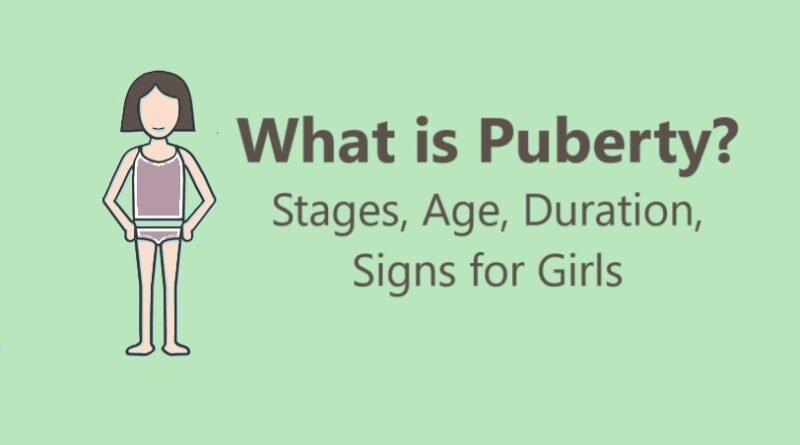What is Puberty? | Stages, Age, Duration, Signs for Girls
Puberty is a natural process of growth and development when a child’s body begins to change into an adult body. These changes prepare the body for reproduction and include physical, emotional, and hormonal changes. Puberty is triggered by hormones released by the brain and glands, and it happens over several years. For girls, puberty is an important phase of life that involves significant transformations.
Stages of Puberty
Puberty is typically divided into five stages, known as Tanner stages. These stages help describe the visible changes that occur during puberty:
- Stage 1 (Prepuberty):
- No visible signs of puberty yet.
- Hormones are starting to become active inside the body.
- Stage 2:
- Breast development begins (called breast budding).
- Small, firm lumps form under the nipples.
- Growth of pubic hair starts, which is usually soft and sparse.
- Height growth begins to accelerate.
- Stage 3:
- Breasts continue to grow and change shape.
- Pubic hair becomes darker and coarser.
- Height growth reaches its peak.
- The skin may become oilier, leading to acne.
- Stage 4:
- Breasts take on a fuller shape.
- Pubic hair becomes thicker and spreads to the inner thighs.
- Menstrual periods typically begin in this stage.
- Underarm hair starts to grow.
- Stage 5 (Mature Stage):
- Full breast development is reached.
- Pubic hair appears in an adult pattern.
- Height growth slows down and eventually stops.
- The reproductive system is fully developed.
At What Age Does Puberty Begin?
The age at which puberty begins can vary from person to person, but for girls, it generally starts between the ages of 8 and 13. Factors that influence the timing of puberty include genetics, overall health, and environmental factors. Some girls may start earlier or later than this range, and both are usually normal.
How Long Does Puberty Last?
For most girls, puberty lasts about 4-6 years. However, the exact duration can vary. Some girls may experience all the changes in a shorter time, while others might take longer to fully develop.
Signs of Puberty in Girls
- Breast Development:
- One of the first signs of puberty.
- Breasts grow gradually over several years.
- Growth of Pubic and Underarm Hair:
- Starts as fine, light-colored hair and becomes darker and coarser over time.
- Growth Spurts:
- Rapid increase in height and weight.
- Bones grow longer, and the body shape changes.
- Menstruation (Periods):
- Typically starts about 2-3 years after breast development begins.
- Marks the body’s ability to reproduce.
- Skin and Hair Changes:
- Oil glands become more active, causing acne and greasier hair.
- Body Shape Changes:
- Hips widen, and the body takes on a curvier shape.
- Fat distribution shifts to areas like the hips, thighs, and breasts.
- Mood Swings:
- Hormonal changes can cause emotional ups and downs.
- Girls may feel more sensitive, irritable, or self-conscious.
- Sweating and Body Odor:
- Sweat glands become more active, leading to noticeable body odor.
Emotional Changes During Puberty
Hormonal shifts during puberty can affect emotions. Girls may experience:
- Increased sensitivity and self-awareness.
- Feelings of insecurity or self-consciousness about their changing bodies.
- Stronger emotions, like happiness, sadness, or anger.
- A desire for independence from parents.
- Changes in relationships with friends and family.
How to Cope With Puberty
- Learn About the Changes:
- Understanding what is happening can make the process less confusing.
- Parents and caregivers should talk openly about puberty.
- Maintain Good Hygiene:
- Shower regularly to manage sweat and body odor.
- Use deodorant and keep skin clean to reduce acne.
- Eat a Balanced Diet:
- Proper nutrition supports healthy growth and development.
- Stay Active:
- Regular exercise helps with physical and emotional well-being.
- Talk About Feelings:
- Sharing thoughts and emotions with trusted adults or friends can help girls feel supported.
- Use Period Products:
- Learn how to use pads, tampons, or menstrual cups for comfort during periods.
- Ask Questions:
- Girls should feel free to ask questions about their bodies and changes.
When to See a Doctor
Although puberty is a normal process, some situations may require medical advice:
- If puberty starts before age 8 or hasn’t started by age 13.
- If periods haven’t begun by age 16.
- If there is severe acne or other skin issues.
- If emotional changes are affecting daily life significantly.
Conclusion
Puberty is a natural and important part of growing up. For girls, it brings many physical, emotional, and hormonal changes. While it may feel overwhelming at times, understanding the process and knowing what to expect can make it easier. Support from family, friends, and healthcare professionals is essential to help girls navigate this phase with confidence and ease.
Read also: What is Puberty? | Stages, Age, Duration, Signs for Boys


Pingback: What is Puberty? | Stages, Age, Duration, Signs for Boys - Bharat Articles